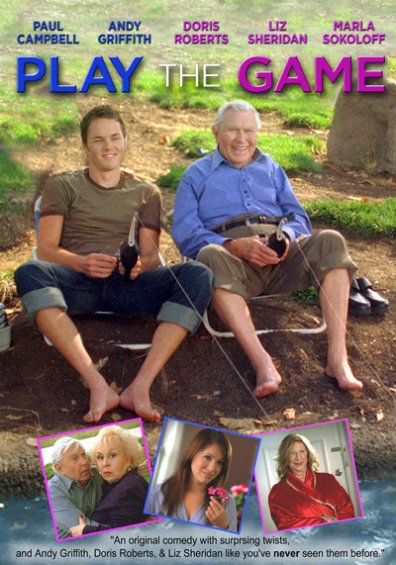Play the Game
Posted on April 26, 2010 at 12:00 pm
The players get played in a romantic buddy comedy with one important distinction — one of those players is the resident of an assisted living facility who gets some assistance he was not expecting when a frisky fellow resident slips him some Viagra. And that resident is played by Andy Griffith. Opie, I don’t think we’re in Mayberry any more.
Paul Campbell (“Knight Rider,” “Battlestar Galactica”) plays David, a car salesman whose standard operating procedure is spin, whether with the customers or the ladies. The one true thing in his life is his relationship with his grandfather, Joe (Griffith). David visits Joe regularly and makes sure he is well taken care of. And since David’s idea of being well taken care of includes female companionship (and more than companionship), David starts to coach his grandfather on how to get as much action from as many ladies as possible. Joe is not the quickest of studies. It has been a while since he dated. But he has one thing going for him — numbers. Most of the residents of the home are women, and it seems that almost all of them are very interested in some companionship themselves. And more than companionship. At least one of them, Edna (played by “Seinfeld’s” Liz Sheridan) is quite frisky. But we know she will not be The One because she has a funny old-lady name. Rose (“Everybody Loves Raymond’s” Doris Roberts), on the other hand, has a pretty name. And a pretty grand-daughter.
She has a pretty name, too — Julie (Marla Sokoloff of “The Practice” and “Dude, Where’s My Car?”). David tries his best maneuvers on her. But she manages to evade them and he finds himself caring about her.
It all feels thin and sit-com-y, in part because its quintet of performers are all associated with television. It slides uneasily from frothy rom-com to raunchy ew-fest, with sexual references and situations so explicit the film would have qualified for an R-rating without Griffith’s disinfectingly innocent line readings and the MPAA’s automatic assumption that geriatric sex is more comic than erotic. The plot twists are awkwardly handled. And Campbell is bland. But the film shows promise in its writer-director Marc Fienberg, whose affection for his senior citizen characters is palpable and whose commitment to making them real characters is appealing. Too often, older characters are one-dimensional, on screen just to pass along life lessons, usually involving their deaths. But even with the heightened rhythms of a broad comedy, these are vibrant, engaged, real people. Campell is bland by comparison. But Sokoloff is a find, and she makes Julie so appealing we can see how she has David wondering if he’s been playing for the wrong team.


